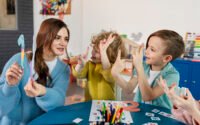What is early childhood education, and why is it so important for every child’s future?
Picture a world where all children begin their school years with interest, joy, and self-assurance. That world starts with schooling for young children.
From the first smile to the first step, a child’s early years are truly beautiful. A child’s brain grows and changes faster in their first eight years than at any other time in their life, according to decades of study. That’s why early childhood education (ECE) isn’t just a stage; it’s the base for everything that comes after.
This blog talks about what early childhood education really is, why it’s important in the world we live in now, and how parents, teachers, and organisations can work together to make the future better for every child.
How do you teach young children?
Early childhood education is all the official and informal lessons that kids from birth to age 8 get.
- Programs for preschool and kindergarten
- Learning through play in daycares
- Homeschooling with help from parents or other carers
What is the goal? The goal is to foster mental, emotional, social, and physical growth in children by providing them with age-appropriate, enjoyable, and inclusive experiences.
Why are the first few years of life so important?
In the first five years of life, 90% of brain growth takes place.
UNESCO and Harvard’s Centre on the Developing Child say that children make neural links in their early years that will affect their health, behaviour, and ability to learn for the rest of their lives.
Early education isn’t just about teaching kids their ABCs and 123s; it’s also about helping them:
- Figure out how to learn.
- Make your ties healthy.
- Express themselves with confidence
- Build up your emotional knowledge and resilience.
What are the most important parts of good early childhood education?
Early childhood education that works goes beyond the coursework. Taking part in:
- Teachers who are qualified: Teachers who have been trained well make learning spaces that are safe, welcoming, and right for each child’s age and stage of growth.
- Learning through play: Kids learn while they play, not while they are taking a break. Kids learn about the world, improve their speaking skills, and strengthen their bodies through play.
- Places that are safe and interesting: Open-ended toys, outdoor play, and child-sized tools all help kids learn to explore and be independent.
- Developing social and emotional skills: ECE focusses on teaching kids important life skills like recognising their feelings, developing understanding, and working together.
- The Role of Parents: A child learns most from his or her parents. Early learning has a bigger effect when teachers and families work together well.
A Global View: Why People Around the World Are Putting Money Into ECE
Early childhood education is very important in places like Finland, Singapore, and New Zealand, which is why they are world stars in it.
- Getting rid of future learning gaps
- Getting better economic results
- Promoting fairness in society
Frequently Asked Questions (FAQs)
Q1: What age range does early childhood education cover?
Early childhood education is for kids from birth to age 8, which is the most important time for their growth.
Q2: What’s the point of early childhood education? Why should parents know about it?
For kids, home is their first school. Parents help their kids learn early on, which aids in developing speaking skills, staying emotionally stable, and being ready for school.
Q3: Who can become a teacher for young children?
You can, if you get the right skills! You can learn to be a teacher if you love working with kids and are patient and creative.
Q4: What kinds of skills do kids learn in early childhood groups?
They learn how to get along with others, read and do math early on, coordinate their bodies, control their emotions, and solve problems.
Q5: How do I get qualified to teach young children?
Online classes are convenient and don’t cost a lot of money. The Early Childhood Education Program at the AP Teacher Training Institute is a great place to start.
Who Should Be Thinking About Becoming an Early Childhood Educator?
- People who want to be teachers and preschool teachers
- People who work in nursery
- Parents and carers who stay at home
- Social workers and people who support child growth
- Anyone who really wants to make a change in the lives of young people
Long-Term Benefits of Early Childhood Education
| For Children | For Society |
|---|---|
| Better school performance | Reduced dropout rates |
| Stronger emotional health | Lower crime rates |
| Greater creativity and critical thinking | Higher future earnings |
| Positive lifelong learning habits | Economic growth |
Do you want to become a certified early childhood educator? Or are you a parent looking to understand how to support your child’s learning from the start?
Join our globally recognized Early Childhood Education Courses at London College of Teachers (LCT). Learn how to create joyful, meaningful, and lasting impact in children’s lives—anytime, from anywhere in the world.








